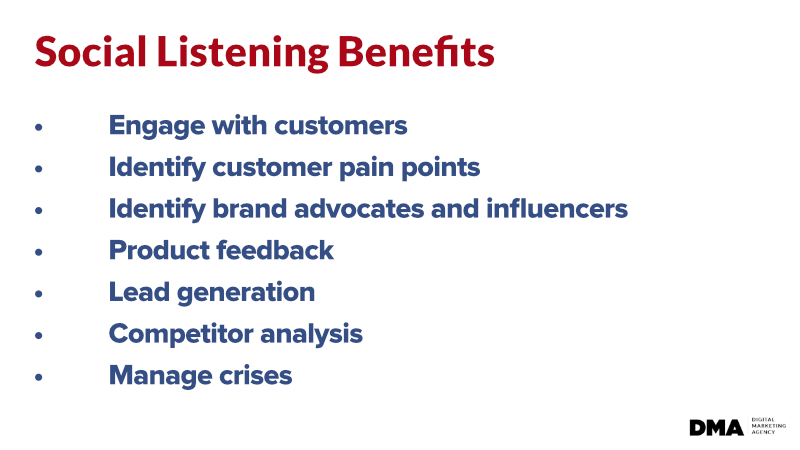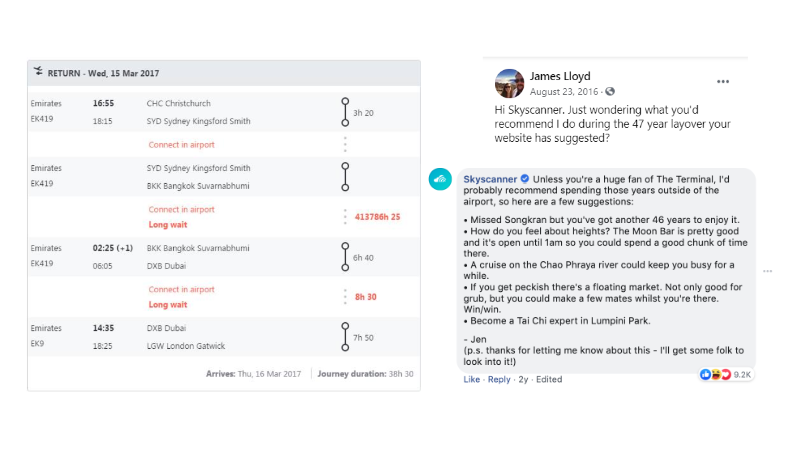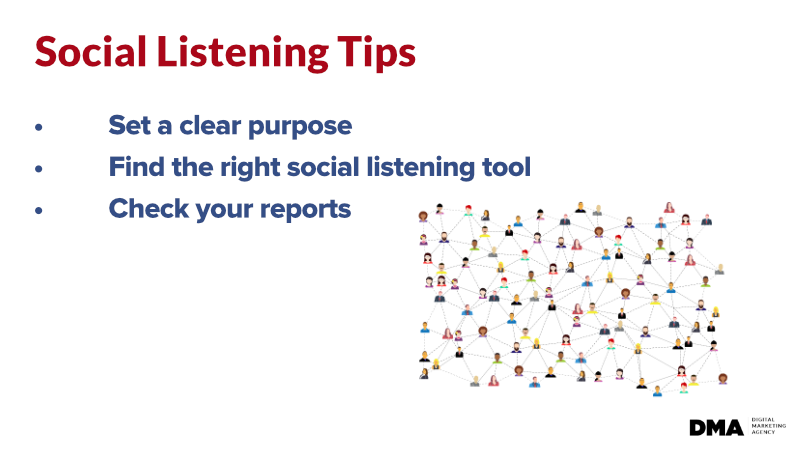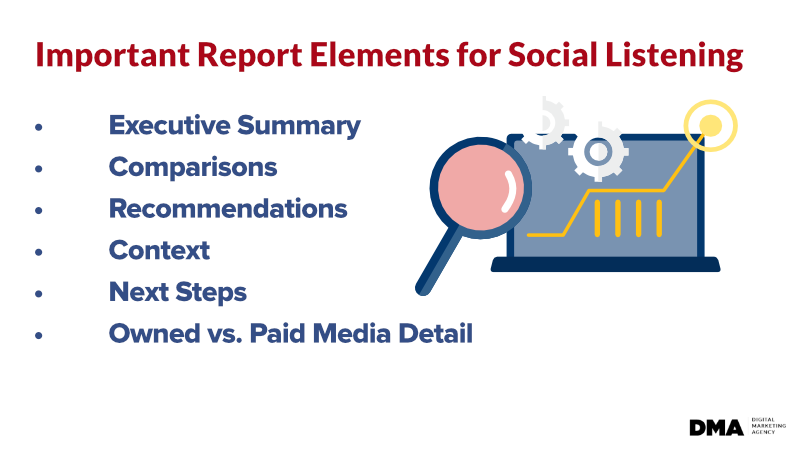SEO
Free SEO Analysis
SEO Services
Content Marketing Services
Local SEO
Link Building Services
Specialized SEO Services
PPC
REPUTATION MANAGEMENT
Free Reputation Management Analysis
Reputation Management Services
Review Management Services
Specialized Reputation Management Services
CEO Reputation Management
Brand Enhancement
Business and Directory Listings
Comprehensive Reputation Management Audit
SOCIAL MEDIA
Free Social Media Analysis
Specialized Social Services
WEB DEVELOPMENT
Free Website Analysis
Web Design Services
Mobile Development Services
Website Maintenance Services
Specialized Development Services
MARKETING AUTOMATION
Free Marketing Automation Analysis
Specialized Marketing Automation Services
Comprehensive Marketing Automation
INDUSTRIES
ABOUT DMA
Reputation Management
How to Use Social Listening to Boost Your Brand's Reputation
Request a quote
Its Fast, Easy & Free
Executive Summary
- You may have heard the terms “social listening” and “social media monitoring” used interchangeably, but they’re really two different tactics.
- Social monitoring tells you what people are saying, but social listening gives you the why.
- Tracking what your customers are saying about your product can help you gain a better understanding of how they use your product, what they love, and what they wish it could do.
Social listening lets you easily tap into what people are saying about your brand and your competitors on social media. When you have a social listening strategy in place, you can gather information about conversations and trends in your niche, industry, and about your brand.
This information is invaluable for marketers and social media managers, to be sure, but it’s also a great way to gather business intelligence that you can leverage company-wide.
In this article, we’ll show you how to use social listening and social listening tools to boost your brand’s online reputation and help your business grow.
First, let’s find out what social listening actually means, how it differs from social monitoring, and the benefits you can expect from a strong social listening strategy.
What Is Social Listening?
Social listening is the practice of tracking mentions of certain words and phrases across social media.
This typically revolves around brand reputation management but can extend to research about the types of products and services your audience is looking for, or even how you can improve your processes to attract and retain customers.
You can track mentions of:
Brand names (like yours and your competitors)
Industry
Niche
Campaign hashtags
You can even use complex queries to find high-intent users on social media so you can create a marketing message to target them.
Social listening doesn’t just cover social media. There are also social listening tools that will monitor and track news sites, forums, blogs, and everything else on the internet.
Is Social Listening the Same as Social Monitoring?
You may have heard the terms “social listening” and “social media monitoring” used interchangeably, but they’re really two different tactics.
Social monitoring tells you what people are saying, but social listening gives you the why.
Pretty nuanced, isn’t it?
Just remember that they’re often used together and both are important for your business. Social monitoring helps you gather data from social media while social listening helps you use that data to improve your brand.
Benefits of Social Listening
Social listening is important. If you’re not using it, you’re missing out on a lot of important data that you could use to improve your brand’s online reputation and turn your business into an even bigger success.

Here are just a few benefits of social listening:
Engage With Your Customers
Social listening makes it easy to engage with your customers about your brand. You can see what they’re sharing online and reach out to them to thank them for their kind words or fix a problem that they’re having.
Either way, those customers are going to be left with a nice feeling about your brand.
Skyscanner gives us a great example of a brand using social listening to engage with customers.

Here, a user has mentioned Skyscanner (without even tagging them) in a comment about a glitch on their flight booking site. Skyscanner’s social media manager, Jen, replies with both humor and grace.
Identify Customer Pain Points
Social listening helps you uncover pain points common for your target audience. This makes it easy to adjust your messaging and tweak your products to position your brand as the best solution to those pain points.
Plus, you’ll learn what customers don’t like about your current products. Once you know what’s not working, you can take steps to change it.
Identify Brand Advocates & Influencers
Social listening is a great way to find brand advocates and influencers in your industry or niche who can help you get the word out about your brand.
Once you know who the popular people are in your niche, you can start engaging with them and developing a relationship. Over time, you can turn that relationship into a partnership.
You’ll also want to be on the lookout for customers who are emphatically behind your brand. Enlist them in spreading the word about your business and offer them incentives for bringing in more customers.
Product Feedback
Tracking what your customers are saying about your product can help you gain a better understanding of how they use your product, what they love, and what they wish it could do.
This benefit is twofold: you will learn more about your customers and their needs while gathering data about your products and how to improve on them. Plus, if you find that customers are missing key features that your product already has, you can add product education to your marketing campaigns.
Lead Generation
Social listening is also great for lead generation. When you reach out and connect with your customers where they are, maybe solving some of their problems along the way, they’re going to begin trusting you.
This means that they’re more likely to give you their email list so you can market to them, and it will help set your brand up as the best resource when they’re ready to buy.
Competitor Analysis
Social listening tools give you a really good opportunity to see what’s going on with your competitors.
You can learn how you stack up against them and get important insights into how their customers feel about the products and services your competitor offers. Then, you can use that data to make your product even better and more appealing.
Manage Crises
Social listening lets you track mentions of your brand in real-time. This is so important when it comes to managing issues before they turn into full-blown crises.
If the overall feeling for your brand is low, social listening can help you pinpoint why so you can make the changes you need to make to improve your reputation.
Social Listening Tips to Improve Your Online Reputation
By now, you should be convinced that social listening is a good move for your brand.
But how do you implement it?

In this section, we share the top three social listening tips that will help you stay focused on what matters and get the most from your social listening strategy.
1. Set a Clear Purpose
Social listening can get overwhelming pretty quickly. Social media is a pretty congested place, regardless of the platform you’re using.
By establishing a clear purpose for your social listening strategy, you can stay focused on the biggest needle-movers for your brand. This could be anything from tracking your brand’s campaigns, managing a crisis, finding new trends to jump on, and more.
It’s important to decide what you want to measure and why. Then, tie that back to your overall business goals.
2. Find the Right Social Listening Tools
You can absolutely do social listening without social listening tools, but they make it a lot easier. There are tons of different tools to choose from, each with a unique set of features and functionality.
After you’ve established your purpose and know what data you’re looking for, you can compare those needs against the features of the social listening tools you’re considering.
Here are three of the best social listening tools to check out:
Brand24
Brand24 targets businesses of all sizes and gives you the social insights you need to know what people are saying about your brand online.
It has a mentions feed where you can see what people are saying about your brand in real-time, so you can take action right away. Right from Brand24’s platform.
You’ll also get a Discussion Volume Chart that shows your brand’s mentions in an easy to understand graph. This helps track fluctuations in brand mentions over time so you can see at a glance if there’s an issue.
Brand24 also includes an Influencer Score. This helps you find influencers in your niche or industry so you can start reaching out and building those important relationships.
YouScan
YouScan lets you track five searches in any of its plans, but the search topic can be incredibly detailed, letting you include and exclude keywords and hashtags or use rules.
After you’ve set the parameters for your search, you’ll get a page with the mentions that YouScan has collected for those parameters. You have the option of filtering the results to get to the core of what matters to you.
YouScan offers a tool called Visual Insights that will search through images based on your specified criteria. This can help you get fine-tuned psychographic and demographic info about your customers.
With the Smart Alerts feature, you can have YouScan notify you if any negative sentiments about your brand are found. You can even integrate with your customer support platform.
Agora Pulse
Agora Pulse is easy to set up and lets you easily find and listen to relevant conversions about your brand using included or excluded keywords.
You can also take action right from the Agora Pulse platform. Just click on a monitoring item and you’ll have options to like, reply, retweet, or even reply via direct message.
Plus, you can bookmark, label, or assign any item to a teammate for followup.
3. Check Your Reports
Social listening reports vary across platform and depend on your purpose and how often you pull reports. To get the most from your reporting, there are certain elements that you should look for.

A good social listening report should have:
Executive Summary
An executive summary provides high-level insights and are important for biweekly or monthly reporting. This information lets stakeholders and marketing teams know at a glance what’s going on with your brand’s online reputation for a specified period of time.
Comparisons
Your social listening tool should make it easy to see a comparison on share of voice.
Share of voice is a measure of the market share your brand owns compared to your competitors. This is a reliable marker for brand visibility.
Tracking share of voice helps you find patterns and trends in your brand mentions.
Recommendations
Look for a social listening tool that provides recommendations to improve sentiment around your brand to boost your brand’s reputation quickly.
All the data in the world won’t help you if you don’t know what to do with it.
If you’re not using a social listening tool, you’ll probably want to find a business analyst to help you understand the data that you’ve pulled from your manual social listening efforts.
Context
Context matters. If you don’t know how you got to a data point, you’re never going to be able to tie the data back to actual changes you can implement to improve your brand’s reputation.
Instead of just looking at the data in a vacuum, be sure to capture screenshots of mentions in your reporting to provide stakeholders and marketing teams the context they need to make use of the data.
Next Steps
Just like recommendations, your reports should include a section for next steps.
How is that different from recommendations?
Recommendations will show all the things you could do to address the data points and improve your brand’s sentiment, media breakout, etc. Next steps, then, would give you an action plan of what to do and when.
This will help you make decisions about your marketing strategy, products, and feature releases.
Owned vs. Paid Media Detail
Finally, you’ll want to be able to see detail about your owned and paid media. This will let you know if you’re getting a good ROI on your social listening efforts.
Conclusion
Social listening is a valuable tactic you can use to get insights on how consumers feel about your brand, rising trends in consumer behavior, and what your competitors are up to.
To take your social listening even further, you need a full-service digital marketing agency that can grab those insights and run with them.
Digital Marketing Agency is the solution you need. We not only offer content marketing, SEO, and PPC services but the brand reputation management services you need to build and protect your business.
Contact us today for a free quote!
Our Sales team